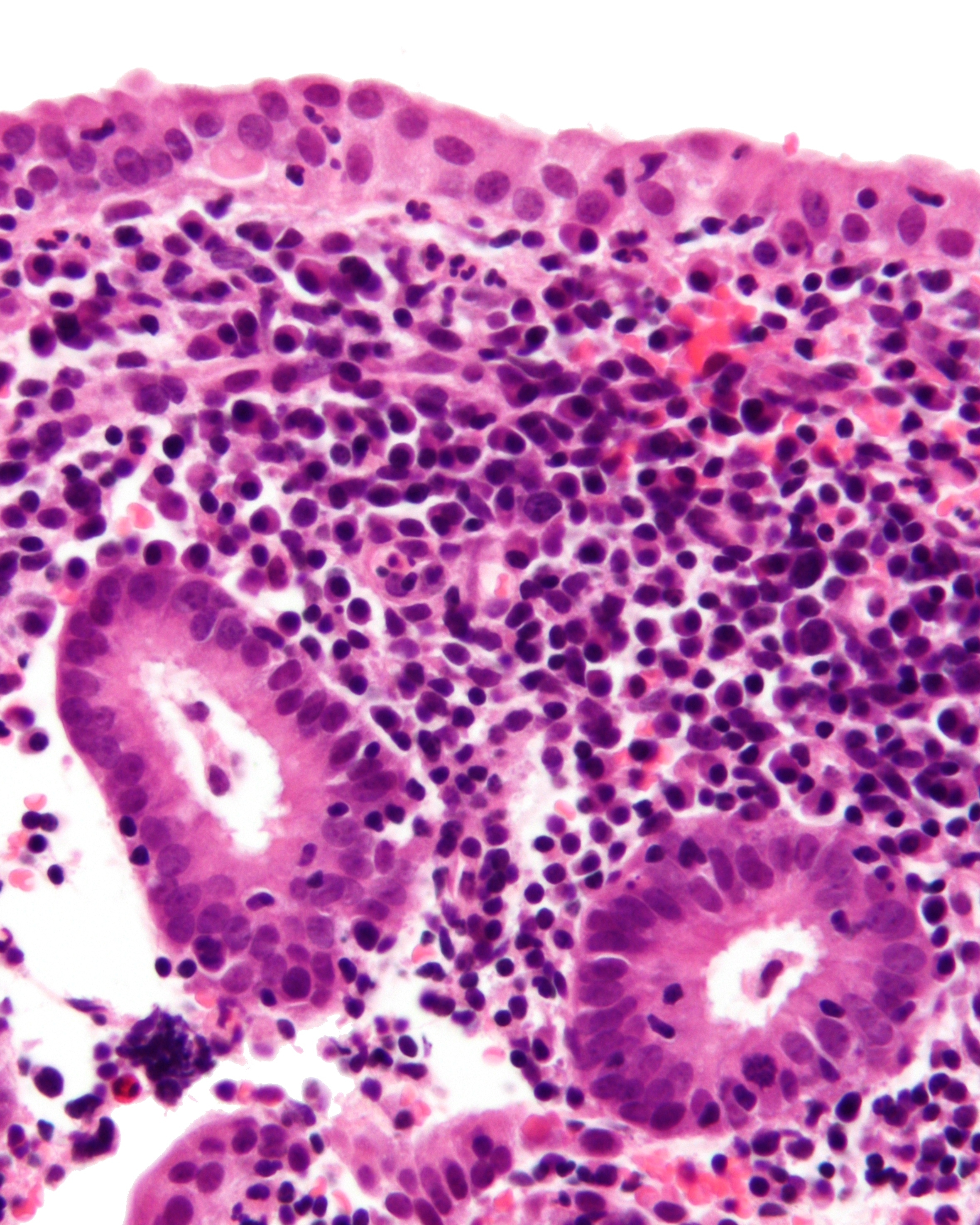Endometritis
(Redirected from Endomyometritis)
Editor-In-Chief: Prab R Tumpati, MD
Obesity, Sleep & Internal medicine
Founder, WikiMD Wellnesspedia &
W8MD medical weight loss NYC and sleep center NYC
| Endometritis | |
|---|---|

| |
| Synonyms | N/A |
| Pronounce | N/A |
| Specialty | N/A |
| Symptoms | Fever, abdominal pain, abnormal vaginal bleeding |
| Complications | Infertility, pelvic inflammatory disease |
| Onset | Usually within 2-10 days after childbirth or miscarriage |
| Duration | Varies, can be acute or chronic |
| Types | N/A |
| Causes | Bacterial infection |
| Risks | Cesarean section, prolonged labor, multiple vaginal examinations |
| Diagnosis | Pelvic examination, ultrasound, endometrial biopsy |
| Differential diagnosis | Endometriosis, pelvic inflammatory disease, retained products of conception |
| Prevention | N/A |
| Treatment | Antibiotics |
| Medication | Clindamycin, gentamicin, ampicillin |
| Prognosis | N/A |
| Frequency | Common in postpartum women |
| Deaths | N/A |
Endometritis is an inflammation or irritation of the endometrium, the lining of the uterus. It is often caused by infections, including sexually transmitted diseases, or after childbirth or a miscarriage.
Causes[edit | edit source]
Endometritis is usually caused by an infection. The most common types of bacteria that cause endometritis are Chlamydia and Gonorrhea, which are sexually transmitted infections. Other causes can include non-sexually transmitted infections, such as Bacterial Vaginosis, or procedures that involve entering the uterus, such as childbirth, miscarriage, or abortion.
Symptoms[edit | edit source]
Symptoms of endometritis can vary, but often include fever, abdominal pain, abnormal vaginal bleeding or discharge, and pain during intercourse or during a pelvic exam. If you have any of these symptoms, it is important to see a healthcare provider.
Diagnosis[edit | edit source]
To diagnose endometritis, a healthcare provider will usually take a medical history and perform a physical exam, including a pelvic exam. They may also order tests, such as a pelvic ultrasound or tests to check for sexually transmitted infections.
Treatment[edit | edit source]
Treatment for endometritis usually involves antibiotics to treat the infection. In some cases, hospitalization may be required. If left untreated, endometritis can lead to serious complications, including infertility, ectopic pregnancy, and pelvic inflammatory disease.
Prevention[edit | edit source]
Preventing endometritis involves reducing your risk of sexually transmitted infections and seeking prompt treatment for any infections. Regular gynecological exams can also help detect and treat endometritis early.
See also[edit | edit source]
Search WikiMD
Ad.Tired of being Overweight? Try W8MD's NYC physician weight loss.
Semaglutide (Ozempic / Wegovy and Tirzepatide (Mounjaro / Zepbound) available. Call 718 946 5500.
Advertise on WikiMD
|
WikiMD's Wellness Encyclopedia |
| Let Food Be Thy Medicine Medicine Thy Food - Hippocrates |
Translate this page: - East Asian
中文,
日本,
한국어,
South Asian
हिन्दी,
தமிழ்,
తెలుగు,
Urdu,
ಕನ್ನಡ,
Southeast Asian
Indonesian,
Vietnamese,
Thai,
မြန်မာဘာသာ,
বাংলা
European
español,
Deutsch,
français,
Greek,
português do Brasil,
polski,
română,
русский,
Nederlands,
norsk,
svenska,
suomi,
Italian
Middle Eastern & African
عربى,
Turkish,
Persian,
Hebrew,
Afrikaans,
isiZulu,
Kiswahili,
Other
Bulgarian,
Hungarian,
Czech,
Swedish,
മലയാളം,
मराठी,
ਪੰਜਾਬੀ,
ગુજરાતી,
Portuguese,
Ukrainian
Medical Disclaimer: WikiMD is not a substitute for professional medical advice. The information on WikiMD is provided as an information resource only, may be incorrect, outdated or misleading, and is not to be used or relied on for any diagnostic or treatment purposes. Please consult your health care provider before making any healthcare decisions or for guidance about a specific medical condition. WikiMD expressly disclaims responsibility, and shall have no liability, for any damages, loss, injury, or liability whatsoever suffered as a result of your reliance on the information contained in this site. By visiting this site you agree to the foregoing terms and conditions, which may from time to time be changed or supplemented by WikiMD. If you do not agree to the foregoing terms and conditions, you should not enter or use this site. See full disclaimer.
Credits:Most images are courtesy of Wikimedia commons, and templates, categories Wikipedia, licensed under CC BY SA or similar.
Contributors: Prab R. Tumpati, MD

